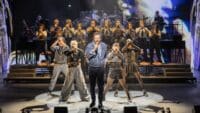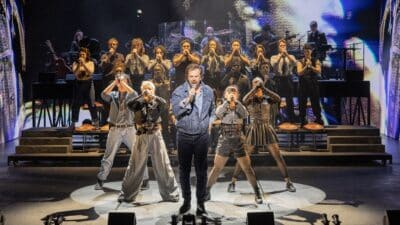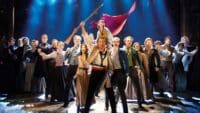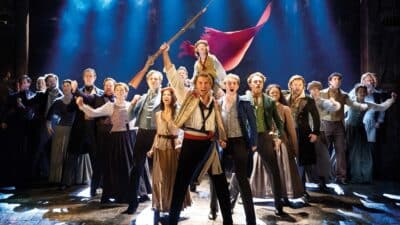Interview

Interview
Julie Odell: “My whole perspective on life has changed”
The folk pop experimenter on one of 2022’s most extraordinary debuts
You wouldn’t expect to find Julie Odell anywhere else. “Oh here, I’ll flip the camera around and show you,” she beams, “I’m right by the Vermillion River in South Louisiana, right in the bayou. Isn’t it a gorgeous morning?”
Infusing her debut album, Autumn Eve, with the spirit of nature, Odell turns Southern landscapes into punchy folk-rock and changing seasons into shifting tempos – letting her music drift with the breeze to become something impossible to pigeonhole. Wherever each track finishes is nowhere near wherever it started; with yodels, strings and scuzzy rock riffs cutting thorough beautiful folk ballads.
As much about her own course as the river’s, Autumn Eve is the story of Odell’s transformative last few years – half written before the birth of her daughter, half after – to paint a picture of motherhood in all the messy colours she can muster. “The album was really scrapped together with very tiny little bits and bobs,” she laughs, “so putting it out there almost felt like jumping off a cliff and flying for a little bit. But the community I had around me, helping me make it work, was huge. So I’m happy that it came out the way it did.”
With Odell set to play a unique one-off show at London’s Lexington on November 16, we sat down to talk through some of the extraordinary stories behind one of the year’s most intimate records.
Autumn Eve spans quite a bit of time in your life. How old is the oldest track?
There are some songs on there that I probably wrote in about 2013. That was just kind of when I was playing solo for a long time, before I got my band, and they were these really small, acoustic, slow songs. And then once I discovered all of the different routes I could with a full band they became these very explosive, crazy high energy things. But yeah, some of them are almost 10 years old.
Did you get a sense of how much you’ve changed as a songwriter over those 10 years when you were reworking those older tracks?
Absolutely. I have a six-year-old now. So some of the songs ended up really changing meaning for me. You know, songs can kind of morph. They’re not fixed. And I’m really glad, because some of those were written about ex boyfriends or things that I don’t need to be thinking about anymore. So a lot of the meanings have changed, but I can use that and relate it to my life now.
How much did motherhood change you as a musician? Do you find yourself drawing from a different place now?
I mean, my whole perspective on life has changed. A lot of the things I used to care about, and used to write about, I just don’t even think about anymore. I don’t give certain things time and energy, you know, because there’s like this whole new realm of life that’s more important to me. So everything changed from that point for me really.
Do you think the younger Julie Odell would be surprised to see the kind of artist you are now?
For sure. I mean, I’ve always been a highly sensitive person, and I’ve always zoomed in on tiny details and overanalysed them. But now I’ve kind of been able to zoom out and see the bigger picture. But I definitely didn’t see that coming.
What were you like as a kid? Where did your love of music come from?
Both my parents are artists. My mom is a painter, my dad makes pottery. So I grew up going to all these different festivals to sell their art, and a lot of them always had music around. I’d get to be there when the festivals were setting up so I’d listen to all the different artists sound checking.
My mom would make little dolls out of the clothes that we had grown out of, and she’d sell them for a quarter outside Walmart in our little town… We she saved up enough money she bought this really old upright piano. And so my family would always play old blue songs on that piano and us kids would dance around the living room. There was always music in the house and there were always records being played. And then one day my sister wrote a song. I was like, ‘how did you do that? That’s crazy! I want to make a song!’ So I’ve been trying to write little songs since I was a kid.
Do you remember connecting with any of those old songs or records in particular?
We were always playing the Mamas and the Papas. And my dad really loved James Taylor. So those were the first things that I was listening to as a kid. But then I got this CD that was just full of rain sounds and frog noises with classical piano music playing along with it. And that was like my biggest jam! I used to pump that through my boombox, just sitting there looking out the window and listening to these nature sounds with classical music. I was raised in the church, so we weren’t really allowed to listen to certain things. But my sister started sneaking me Fiona Apple CDs, so that was in the mix somewhere too.
It makes so much sense listening to Autumn Eve that your first favourite album was just full of frog noises… How important is nature and landscape to your music?
I grew up roaming the woods. I mean, I would literally leave the house when I woke up, and then by the time it got dark, my mom would blow a whistle and I’d run back for dinner. So nature is deeply ingrained in me. It’s on my mind a lot. I relate to the way things grow or the way that rivers flow and it’s the place where I find the most natural kind of therapy. I’m usually sitting outside when I’m writing too, so it just inevitably seeps into every little corner of my music.
‘Cardinal Feather’, in particular, seems to touch on that idea of using nature as a place of escape. What kind of things were you dealing with when you wrote that song?
I’ve always struggled with anxiety. I had panic attacks growing up. There was this one attack that was like a blackout, where I found myself running out of the house and down the street, barefoot. There was a mulberry tree over the sidewalk and I remember running over all these berries. There was this weird, juicy, popping sensation under my feet that kind of snapped me out of this really intense moment. So I wrote about that in ‘Cardinal Feather’, I guess because it was just like the biggest, most uncontrollable panic attack I’d ever had.
A lot of people wouldn’t ever want to relive something like that.
I definitely felt like I needed to write about it. It was such a bizarre experience. When you’re going through a hard time people will reach out, and sometimes it’s tempting to push that away. And I guess I had been doing that for a while. But it was also the first time I really accepted help, and the point when my panic attacks started going away. I don’t really have them anymore, so writing about it was pretty therapeutic for me. I needed to put it out in the open and face it. Address it. Try to find a way to navigate it.
The video for ‘Cardinal Feather’ is so beautiful too. Did you spend a long time figuring out the best way to visualise the story of that song?
We shot that at a swamp called Lake Martin, and in Grand Chenier, right on the southern border of Louisiana where it hits the bayou. There were billions of mosquitoes while we were filming, and the camera crew were literally trying to blow the mosquitoes off their knuckles while they got the shots. I mean, they were in our hair. They were smashed all in our clothes. We were inhaling them. And then we had huge gators crossing the road too. Grand Chenier has been hit by so many hurricanes now that there’s just foundations of houses everywhere you look. There’ll be like a truck in a tree, and a doorway over across a field, and a shoe. So it’s this really gorgeous landscape because everything’s been grown over, but it’s also really sad to be there and see all these remnants of history. It was perfect.
Every track on Autumn Eve moves through such range of sounds and dynamics and emotions like that. What is it about that kind of songwriting that appeals to you?
I really love storytelling. And I love having this big moment where you’ve been waiting for me to tell you this part, and then… ‘here it is’. I’ll do a lot of my songwriting in bits and pieces too, so I’ll record a little part on my phone and write down some lyrics, and then I’ll put it away for a while, before write another little bit and smushing them together. It just makes it more fun for me, but I also just have a hard time sticking to structure I think. It took me a long time to realise I don’t really write choruses and verses, it’s just kind of a stream of conscious, most of the time. It’s funny, I’ll try to sit down and be like, ‘Hey, I’m gonna write a structured song!’, and then it doesn’t ever really work out.
Is it true that you used to chase tornados when you were a kid? That says a lot about your opposition to structure!
Have you seen the movie Twister with Helen Hunt? I saw that when I was a kid and I was like, ‘these people are incredible! I want to be a part of this punk ass team!’ I loved the idea of chasing danger, hooting and hollering and blasting music. Being all dirty and sweaty. So I became obsessed with the idea of growing up to be a meteorologist. Anytime in school when they asked me about my five-year plan, I was just like, ‘I’m gonna be chasing tornadoes. And that’s gonna be my life. And I’m gonna be in a really cool looking truck with big headlights on it!’. But I didn’t go on to do that. I went to a school for sculpture. But I guess now I’m kind of chasing this music industry tornado, so it sort of worked out in a way!
The last track on the album, ‘Autumn Eve’ tells a pretty incredible story about the moment you gave birth. Did it happen the way you describe it in the song?!
Absolutely! I was working on a farm in South Carolina while I was pregnant. I was pruning apple trees and making apple pie. The night I went into labour, my midwife was two hours away from me and there was talk on the radio that we were going to get the biggest blizzard in 25 years. So I called her up and I described all my contractions to her and she told me to go to sleep and drive over in the morning. Me and my partner lived in a really tiny cabin, way out in the woods, on like a mile-long stretch of gravel road. So we go outside and check that there’s no snow, and we go to bed.
And this bat got into our cabin… It’s a really old cabin so there are holes in the walls. We were coaxing the bat outside and we opened the door see two inches of snow on the ground. We knew we had to pack the car up and leave, otherwise we’re were gonna get snowed in, and we don’t know how to have a baby by ourselves. So we start driving and it’s a complete whiteout. You can’t see the woods. You can’t see the ditches. You can’t see the cliffs or even the mountain. As soon as we get on the highway our car just turned sideways and we’re just sliding down the mountain. Somehow we stayed on the road, but it took us about four hours to get to the midwife.
Except when we get there, all of the power is out. I was in labour for 10 hours and she was using this big old flashlight the whole time. I was hallucinating from the pain, and just from the chaos of the power being out in this huge blizzard, so I started seeing that ’90s screensaver, where all the stars are flying at you. I was flying through that screensaver, and then I boarded this mid-century modern UFO and all these purple space people were helping me through my contractions.
When I drifted back out of my hallucinations the people around me would all be whispering together. I didn’t know it at the time, but they were really scared. My baby was turned around the wrong way and my midwife was basically preparing my partner for me to possibly not make it through the night. Somehow, my brain letting me hallucinate through all that was a big reason why I was able to surive.
And my daughter she came out and everything was beautiful. We went back to our cabin and there was snow everywhere. There were all these animal tracks leading up to our front door and walking away again, like deer and foxes and bunny rabbit tracks, all in this little walkway right up to our front door. They were checking to see if I’d had the baby.
It all ended up being this really insane but really magical experience, and that whole story is encapsulated in the last song of the record.
What an incredible story. How do you feel about putting such a personal side of yourself out there on the record? It must feel especially vulnerable singing that live?
I mean, I love performing. I guess I kind of enter into this other personality on stage. Normally, if I had to get up and talk in front of people, I wouldn’t be able to do it. But performing and being able to sing just feels different. I love the adrenaline of it. And my band is so in the pocket no matter what happens. And they’re just such sweet people too, so to get to turn around and look at their faces and just be like, ‘we’re doing this on a stage in front of people!’, it’s crazy. And it’s fun. I just love it. And I’m really, really excited to do it across the ocean in London too.
Have you thought further ahead yet?
My best friend [Teddy Lamson] is an engineer and she’s in a band called Givers. She’s the drummer for Peaches too. She and I also have a band together called The Jelly Sisters. And we’re just like a cover band of fun, silly songs. But she’s an engineer at this really incredible studio in New Orleans and she’s been working with me on my next record, which is all the songs I wrote in quarantine. And, you know, inevitably they were all songs I wrote by myself in a very quiet room, so the feeling of them is more like that. But we ended up adding strings and a vibraphone and all these different layered vocals. I’ve got almost half the record recorded already. And yeah, I’m excited to have a bunch of new songs to play. I’m ready to move on.
Julie Odell is playing The Lexington on London on November 16. Tickets are available here.









